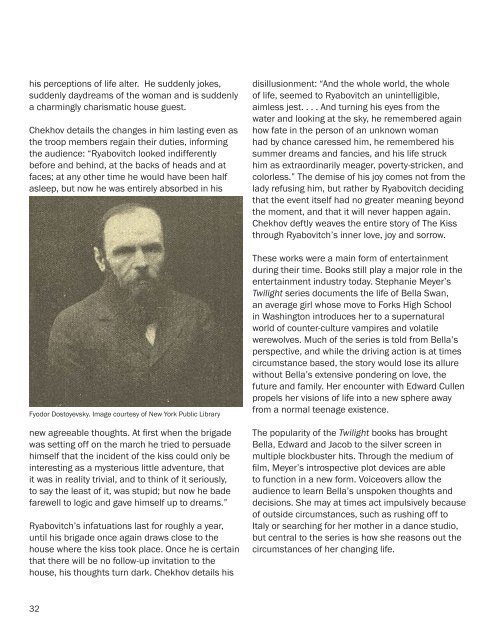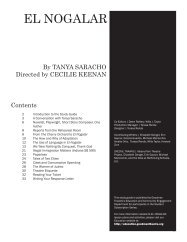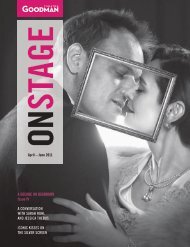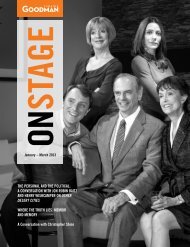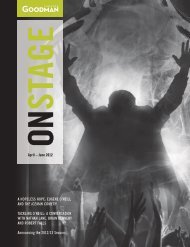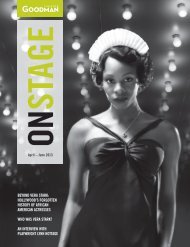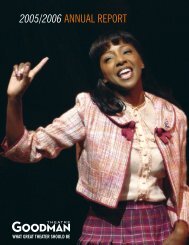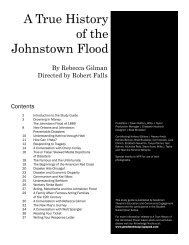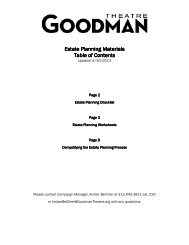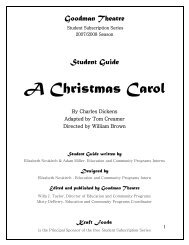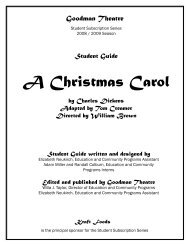The Seagull Study Guide (12MB) - Goodman Theatre
The Seagull Study Guide (12MB) - Goodman Theatre
The Seagull Study Guide (12MB) - Goodman Theatre
Create successful ePaper yourself
Turn your PDF publications into a flip-book with our unique Google optimized e-Paper software.
his perceptions of life alter. He suddenly jokes,<br />
suddenly daydreams of the woman and is suddenly<br />
a charmingly charismatic house guest.<br />
Chekhov details the changes in him lasting even as<br />
the troop members regain their duties, informing<br />
the audience: “Ryabovitch looked indifferently<br />
before and behind, at the backs of heads and at<br />
faces; at any other time he would have been half<br />
asleep, but now he was entirely absorbed in his<br />
Fyodor Dostoyevsky. Image courtesy of New York Public Library<br />
new agreeable thoughts. At first when the brigade<br />
was setting off on the march he tried to persuade<br />
himself that the incident of the kiss could only be<br />
interesting as a mysterious little adventure, that<br />
it was in reality trivial, and to think of it seriously,<br />
to say the least of it, was stupid; but now he bade<br />
farewell to logic and gave himself up to dreams.”<br />
Ryabovitch’s infatuations last for roughly a year,<br />
until his brigade once again draws close to the<br />
house where the kiss took place. Once he is certain<br />
that there will be no follow-up invitation to the<br />
house, his thoughts turn dark. Chekhov details his<br />
disillusionment: “And the whole world, the whole<br />
of life, seemed to Ryabovitch an unintelligible,<br />
aimless jest. . . . And turning his eyes from the<br />
water and looking at the sky, he remembered again<br />
how fate in the person of an unknown woman<br />
had by chance caressed him, he remembered his<br />
summer dreams and fancies, and his life struck<br />
him as extraordinarily meager, poverty-stricken, and<br />
colorless.” <strong>The</strong> demise of his joy comes not from the<br />
lady refusing him, but rather by Ryabovitch deciding<br />
that the event itself had no greater meaning beyond<br />
the moment, and that it will never happen again.<br />
Chekhov deftly weaves the entire story of <strong>The</strong> Kiss<br />
through Ryabovitch’s inner love, joy and sorrow.<br />
<strong>The</strong>se works were a main form of entertainment<br />
during their time. Books still play a major role in the<br />
entertainment industry today. Stephanie Meyer’s<br />
Twilight series documents the life of Bella Swan,<br />
an average girl whose move to Forks High School<br />
in Washington introduces her to a supernatural<br />
world of counter-culture vampires and volatile<br />
werewolves. Much of the series is told from Bella’s<br />
perspective, and while the driving action is at times<br />
circumstance based, the story would lose its allure<br />
without Bella’s extensive pondering on love, the<br />
future and family. Her encounter with Edward Cullen<br />
propels her visions of life into a new sphere away<br />
from a normal teenage existence.<br />
<strong>The</strong> popularity of the Twilight books has brought<br />
Bella, Edward and Jacob to the silver screen in<br />
multiple blockbuster hits. Through the medium of<br />
film, Meyer’s introspective plot devices are able<br />
to function in a new form. Voiceovers allow the<br />
audience to learn Bella’s unspoken thoughts and<br />
decisions. She may at times act impulsively because<br />
of outside circumstances, such as rushing off to<br />
Italy or searching for her mother in a dance studio,<br />
but central to the series is how she reasons out the<br />
circumstances of her changing life.<br />
32


